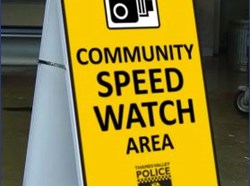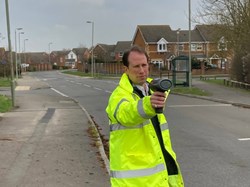Community Speed Watch
Community Speedwatch is a national initiative where proactive members of local communities join with the support and supervision of their local police to record details of speeding vehicles using approved detection devices.
For many understandable reasons, enforcement and broad-stroke campaigning have made little progress over the past decade, and focused, large-scaled education is currently only organised efficiently in the shape of Speed Awareness Courses after an offence is detected. Modern preventative educational methodologies like Speedwatch have yet to been utilised to its fullest extent. Now is a good time to change that..
Research show that on average 97% of speeding offences (not including Speedwatch observations) are detected by speed cameras. The vast majority of these are fixed at the roadside in areas known to both local residents and regular commuters, hence - and in spite of the so-called 'Halo-effect', they have little effect in areas not covered by camera technology.
Equally relevant - and especially to rural areas where fatalities are four times more likely to happen than in urban areas, the discussion about road safety has a tendency to focus on number of collision casualties alone. In most areas where Speedwatch operates and where speeding evidently is a concern to the communities, the quality-of-life issue as well as feeling safe when using the roads recreationally, are equally important to the affected areas' residents. This is not an attempt at diminishing the dismay of the high number of fatal and seriously injured victims but a reminder that the problem of speeding goes well beyond quantifying its consequences with casualty statistics alone.
Registered keepers of vehicles exceeding the speed limit are contacted - initially with a letter explaining the potential risks and consequences of their dangerous behaviour. Repeat offenders will receive a visit from the local police, irrespective of where they live. Beyond these friendly gestures, focused enforcement and criminal prosecution follow based on the collated evidence.
CSW Online operates nationally on behalf of the police and communities to organise and join up Speedwatch activity. The organisation coordinates responses based on the collated data from all groups involved. Speeding is not just a local phenomenon - and neither is Speedwatch.
Speeding is everyone's concern
Frustrations with apparent lack of interest by the police in dangerous levels of speeding is widespread and felt everywhere. There is, however, no cynicism involved, only lack of funding, resources, and a political reluctance to prioritise unintentional killing over or on par with intentional killing. Although more people are killed in traffic than in all other crimes combined, we need to keep in mind that road deaths are a biproduct of a colossal number of miles driven by millions of road users every day. Murder is a very different story.
That does not excuse - or make the death, destruction, injuries, grief, and devastation by a traffic collision any more acceptable. Speed kills, end of story. Speeding is antisocial, and collisions caused by driving too fast for the circumstances are wholly avoidable. But where do we start? Prevent the automotive industry from selling cars that can exceed the national maximum speed limit, and accelerate at atrociously short times? Change the road infrastructure? Throw fines at the 52% of drivers who admit to speeding? Confiscate and crush their vehicles? We believe that intelligent, personalise education is the answer to solve the problem for most offenders, especially if we can mass-organise the recording of driver details.
Meanwhile, people die needlessly in avoidable crashes caused by inattentive or antisocial drivers. In most of the rest of the country, residents feel unsafe using their local roads, their quality of life is diminished, and half of the UK population is angered by the fact that not many seem to be bothered, or even worse: they just talk and write reports with no or little effect or change.
Speedwatch activity is not about interfering with neighbours' behaviour; it is a proactive solution to improve the safety and quality of life for everyone in their local community.
https://www.communityspeedwatch.org/FRONT-v2-Home.php
https://www.thamesvalley-pcc.gov.uk/get-involved/community-speedwatch/

To help improve road safety, Community Speedwatch provides communities with equipment and training to monitor speeding in their area.
Organised by TVP, in partnership with Community Speedwatch UK, speedwatch groups in the Thames Valley are provided with a starter kit on a loan basis, including a speed detection device, to help volunteers assist in the battle against speeding motorists.
Community teams undergo a number of training sessions online and police risk assessments to ensure safety at the roadside.
An online platform allows group-related activities to be self-regulated via an online calendar and also provides vehicle make recognition training. DVLA pre-checks logged registration numbers for authenticity before automatically passing data on to the police for further processing.


